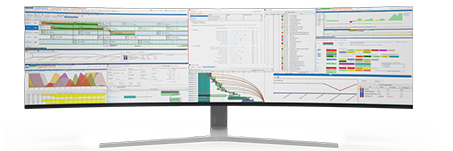Scheduling Challenges in the Industrial Manufacturing Industry
Are you constantly grappling with the complexities of scheduling in industrial manufacturing? Efficient production planning is at the heart of a successful manufacturing facility, influencing everything from resource utilization to customer satisfaction. As technology continues to evolve, integrating robust scheduling solutions with enterprise resource planning (ERP), supply chain management (SCM), and manufacturing execution systems (MES) has become imperative.
This blog aims to shed light on the scheduling challenges in the industrial manufacturing industry and explore how integrating PlanetTogether with leading ERP, SCM, and MES systems can pave the way for streamlined operations, enhanced productivity, and a more responsive and adaptive manufacturing environment.

The Landscape of Scheduling Challenges
Dynamic Demand Fluctuations
In industrial manufacturing, demand is anything but static. Changes in customer orders, market trends, and unforeseen disruptions can lead to frequent adjustments in production schedules. This dynamism poses a significant challenge for Operations Directors who need to strike a delicate balance between meeting customer expectations and optimizing resource utilization.
Resource Constraints and Optimization
Managing resources effectively is critical for operational efficiency. This includes human resources, machinery, and raw materials. Scheduling challenges often arise when there's a misalignment between resource availability and the demands of the production schedule. Optimizing these resources to ensure maximum output without compromising quality is a constant struggle.
Supply Chain Variability
Globalized supply chains bring immense opportunities but also introduce a new set of challenges. Sudden disruptions in the supply chain, whether due to geopolitical events, natural disasters, or logistical issues, can send ripples through the entire production process. Adapting schedules to account for these variables is crucial to avoid bottlenecks and delays.
Data Silos and Communication Gaps
Many manufacturing facilities still struggle with data silos and communication gaps between different departments. This lack of integration often results in a fragmented understanding of the production process, leading to suboptimal decision-making and, consequently, scheduling inefficiencies.
![]()

The Role of Advanced Scheduling Solutions
PlanetTogether, a leading advanced planning and scheduling (APS) software, has emerged as a game-changer in addressing these scheduling challenges. Its robust features, including real-time scheduling, scenario planning, and what-if analysis, empower Operations Directors to make informed decisions. However, the true potential of PlanetTogether is unlocked when seamlessly integrated with ERP, SCM, and MES systems.
Integration Benefits: Unlocking Synergies
Real-Time Data Sync Across Systems
Integrating PlanetTogether with ERP systems like SAP, Oracle, or Microsoft ensures that real-time data is synchronized across the entire enterprise. This eliminates the risk of outdated information leading to discrepancies in scheduling and production planning.
Holistic View of Operations
Combining PlanetTogether with MES systems provides Operations Directors with a holistic view of operations, from the shop floor to the executive suite. This visibility allows for better decision-making, as it considers real-time production data and the impact of scheduling changes on the overall business objectives.
Enhanced Supply Chain Collaboration
Integrating PlanetTogether with SCM systems facilitates improved collaboration throughout the supply chain. It enables Operations Directors to factor in external variables such as supplier lead times, transportation constraints, and market demand, ensuring a more responsive and adaptive scheduling approach.
Optimized Resource Utilization
By integrating with ERP systems, PlanetTogether can tap into resource management modules, ensuring optimal utilization of human and machine resources. This integration helps in aligning production schedules with workforce availability, reducing downtime, and maximizing output.
Reduced Data Entry Redundancies
Automation of data flow between PlanetTogether and ERP, SCM, and MES systems reduces the risk of human errors associated with manual data entry. This not only improves data accuracy but also frees up valuable time for Operations Directors to focus on strategic decision-making.
Considerations for Successful Integration
While the benefits of integrating PlanetTogether with ERP, SCM, and MES systems are substantial, the process requires careful planning and execution. Here are some key considerations for a successful integration:
Clear Objectives and Requirements
Define clear objectives for the integration, considering the specific needs and challenges of your manufacturing facility. Identify the key functionalities required from both PlanetTogether and the chosen ERP, SCM, and MES systems.
Data Mapping and Compatibility
Ensure that data mapping between systems is well-defined and compatible. This includes mapping production data, resource availability, and scheduling parameters to ensure a seamless flow of information.
Customization and Flexibility
Choose integration solutions that offer customization options to adapt to the unique requirements of your manufacturing processes. Flexibility is crucial, as it allows for adjustments as business needs evolve.
Training and Change Management
Invest in comprehensive training programs for staff to familiarize them with the integrated systems. Address any potential resistance to change through effective change management strategies.
Continuous Monitoring and Improvement
Post-implementation, establish a robust monitoring and feedback mechanism. Regularly assess the performance of the integrated solution and make necessary adjustments to optimize its functionality continuously.
In industrial manufacturing, scheduling challenges are inevitable. However, by harnessing the power of advanced scheduling solutions like PlanetTogether and integrating them seamlessly with ERP, SCM, and MES systems, Operations Directors can transform these challenges into opportunities for operational excellence.
As the manufacturing industry continues to embrace digital transformation, the synergy between advanced scheduling solutions and comprehensive enterprise systems will undoubtedly play a pivotal role in shaping the future of industrial manufacturing.
Topics: Industrial Manufacturing, PlanetTogether Software, Integrating PlanetTogether, Optimized Resource Utilization, Enhanced Supply Chain Collaboration, Real-Time Data Sync Across Systems, Reduced Data Entry Redundancies




















LEAVE A COMMENT